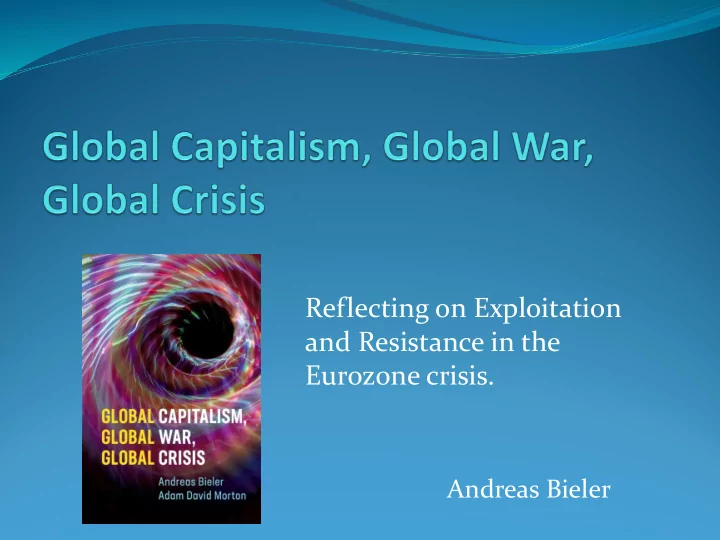

Reflecting on Exploitation and Resistance in the Eurozone crisis. Andreas Bieler
Introduction A necessarily historical materialist moment; 1. 2. Agency - Structure; The material structure of ideology; 3. 4. Class struggle in the Eurozone; Conclusion: ongoing contestation of neo-liberalism; 5.
1. A necessarily historical materialist moment Understanding the historical specificity of capitalism? state vs. market; the economic vs. the political; focus on the social relations of production / ‘the hidden abode of production’ allows us to understand the internal relations between the economic and the political.
2. Agency - Structure a) The structuring conditions of capitalism: Competitiveness; Crisis tendency; Outward expansion: uneven and combined development;
Agency - Structure b) Structured agency: different class fractions; expanded understanding of capitalism including sphere of production and social reproduction;
3. The material structure of ideology ideas are not some kind of objective knowledge: e.g. economic theories; ideas are not simply discourses disconnected from agency; ideas are understood as ideology with an underpinning material structure: whose interests are served by certain ideas/ideology?
4. Class struggle in the Eurozone a) Causes of the crisis? incorrect institutional set-up of peripheral countries; post-Keynesians: incorrect institutional set-up of Eurozone and EMU; structuring condition of uneven and combined development: countries like Greece and Portugal have been locked into labour intensive production from the moment they joined the EU in the 1980s;
Class struggle in the Eurozone b) Transnational capital and permanent austerity within the EU: crisis of overaccumulation (David Harvey); austerity imposed in bailout agreements on countries in Eurozone crisis as well as mechanisms of New European Economic governance across the EU more generally; austerity policies: employment cuts in public sector; cuts to welfare services; privatisation of national assets; deregulation of labour markets and cut-backs in trade union rights;
Class struggle in the Eurozone: c) The material structure of neo-liberalism: the interests of transnational capital have become internalised within the EU form of state and its policies;
5. Conclusion: ongoing contestation of neo- liberalism Historical materialist focus on class struggle: capitalist order is always contested. worker-occupied factories: Vio.me near Thessaloniki; healthcare clinics in Greece; focus on the commons and new forms of democracy in water management; ongoing resistance to pension cuts in HE in the UK;
Recommend
More recommend